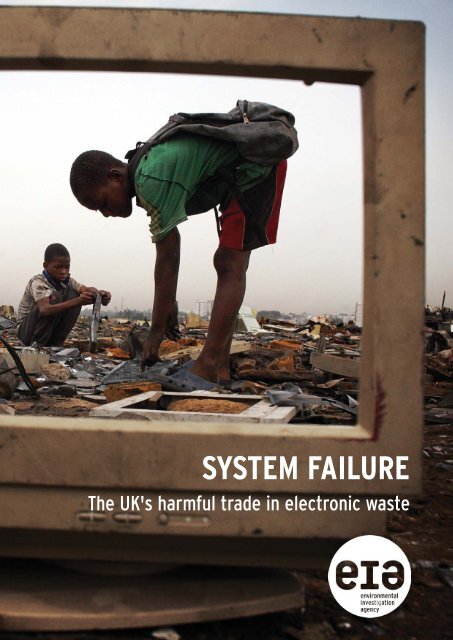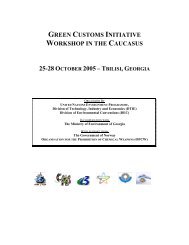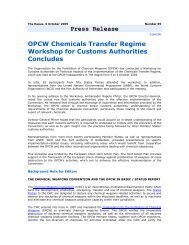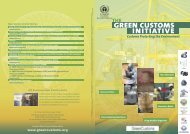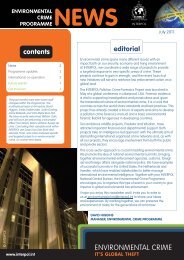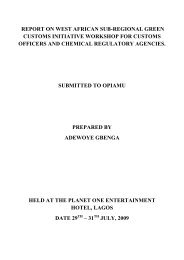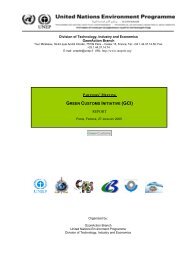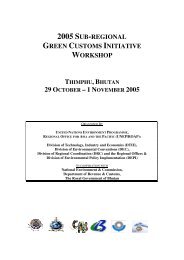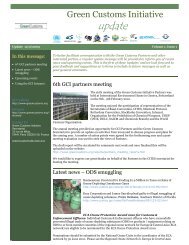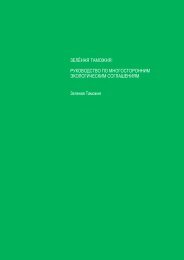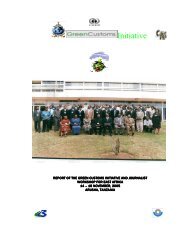EIA, "System Failure" - Green Customs Initiative
EIA, "System Failure" - Green Customs Initiative
EIA, "System Failure" - Green Customs Initiative
Create successful ePaper yourself
Turn your PDF publications into a flip-book with our unique Google optimized e-Paper software.
SYSTEM FAILURE<br />
The UK's harmful trade in electronic waste
ACKNOWLEDGEMENTS<br />
<strong>EIA</strong> wishes to thank the Rufford Foundation for its<br />
generous support of our work on electronic waste.<br />
Report design by:<br />
www.designsolutions.me.uk<br />
Investigations in this report were carried out in<br />
cooperation with Earthsight<br />
www.earthsight.org.uk<br />
May 2011<br />
ISBN: 0-9540768-9-3<br />
ENVIRONMENTAL INVESTIGATION AGENCY (<strong>EIA</strong>)<br />
62/63 Upper Street, London N1 0NY, UK<br />
Tel: +44 (0) 20 7354 7960<br />
Fax: +44 (0) 20 7354 7961<br />
email: ukinfo@eia-international.org<br />
www.eia-international.org<br />
COVER:<br />
© Andrew McConnell/Panos<br />
CONTENTS<br />
1<br />
5<br />
10<br />
13<br />
ILLEGAL TRADE IN ELECTRONIC WASTE<br />
<strong>EIA</strong>'S INVESTIGATIONS INTO E-WASTE SMUGGLING<br />
FIXING THE SYSTEM<br />
RECOMMENDATIONS
ILLEGAL TRADE IN ELECTRONIC WASTE<br />
THE GROWING PROBLEM OF<br />
ELECTRONIC WASTE<br />
Electronic waste, or e-waste, is the common<br />
term for electronic goods at the end of<br />
their ‘useful life’. Computers, mobile<br />
phones and televisions are all types of<br />
electronic goods classified as hazardous<br />
waste under the Basel Convention,<br />
an international treaty regulating crossborder<br />
trade in harmful waste.<br />
Due to the proliferation of electronic<br />
devices and accelerated technology<br />
advances, an increasing amount of<br />
e-waste is created every year. It is the<br />
fastest-growing waste stream in the UK,<br />
with more than one million tonnes<br />
generated annually. 1 Globally, the United<br />
Nations Environment Programme (UNEP)<br />
estimates annual production of e-waste to<br />
be 50 million tonnes, of which only 10 per<br />
cent is recycled. 2<br />
E-waste can be highly hazardous to both<br />
the environment and human health due to<br />
the substances it contains. A computer<br />
processor has an array of dangerous metals<br />
and chemicals such as antimony trioxide,<br />
polybrominated flame retardants, selenium,<br />
cadmium and mercury. Cathode ray tubes<br />
(CRT) found in older-style bulky TVs and<br />
desktop computers often contains large<br />
amounts of lead. As well as potentially<br />
harmful materials, e-waste may also<br />
contain small amounts of valuable metals<br />
such as gold and copper.<br />
A range of regulations at the international,<br />
regional and national levels govern trade<br />
in e-waste. The intent is to promote safe<br />
recycling of broken electronic equipment<br />
and to enable legitimate trade in used,<br />
working equipment. In reality, huge<br />
quantities of discarded e-waste end up<br />
being illegally traded around the world.<br />
The European Union, despite strong<br />
legislation, is a major source of e-waste<br />
which is illegally exported and dumped<br />
in developing countries. An estimated<br />
75 per cent of e-waste generated in the<br />
EU, equivalent to eight million tonnes a<br />
year, is unaccounted for. 3<br />
The destination countries do not have the<br />
infrastructure to recycle e-waste safely.<br />
Instead, it is processed manually in scrap<br />
yards with no consideration for health<br />
and safety. The e-waste is stripped down<br />
to components by hand. Copper wires<br />
are bundled and set alight to remove<br />
flame-resistant coatings, emitting toxic<br />
dioxins; CRT monitors are smashed with<br />
hammers, releasing plumes of lead and<br />
ABOVE:<br />
Children working at an<br />
e-waste dump in Ghana.<br />
© <strong>EIA</strong><br />
1
© <strong>EIA</strong><br />
2<br />
HEALTH AND ENVIRONMENTAL IMPACTS<br />
OF E-WASTE DUMPING<br />
The crude methods used to process e-waste in<br />
developing countries have dire consequences for those<br />
involved and the surrounding environment.<br />
Research at two scrap yards in Ghana where e-waste is burnt and<br />
broken down found lead and other metals in quantities 100 times greater<br />
than in normal soil samples. 7 In Guiyu, a major e-waste processing town<br />
in south-eastern China, the state media estimated almost nine of out 10<br />
residents suffered from problems with their skin, nervous, respiratory or<br />
digestive systems. 8<br />
Harmful chemicals found in e-waste include:<br />
• Arsenic, used in integrated circuit boards and can be a serious threat<br />
to health;<br />
• Beryllium, used in computer motherboards. Its dust is toxic to humans,<br />
causing respiratory problems;<br />
• Cadmium, formerly used in cathode ray tubes. Its oxides are highly<br />
toxic to plants, fish and humans;<br />
• Lead, used in printed circuit boards, and lead oxide is used in cathode<br />
ray tubes. It is toxic to humans and can affect the development of the<br />
brain and central nervous system in children;<br />
• Mercury, used in flat-screen displays. It can leach into water supplies<br />
and become methylmercury, a toxic substance that accumulates in the<br />
food chain;<br />
• Phthalates, also known as plasticisers. Affects reproductive health;<br />
• Selenium, used in printed circuit boards. Exposure to high amounts can<br />
lead to neurological problems. 9<br />
cadmium dust. After the useful metals<br />
are taken out, leftover parts are often<br />
dumped in landfills or rivers, or<br />
simply burnt. 4<br />
Poverty in countries where e-waste is<br />
illegally dumped often leads to young<br />
children being involved in breaking<br />
down the electronic goods. The potential<br />
health consequences for those involved<br />
in this kind of work are dire – reproductive<br />
and developmental problems, damaged<br />
immune, nervous and blood systems,<br />
kidney damage and impaired brain<br />
development in children.<br />
Much of Europe’s e-waste ends up in<br />
West Africa, especially Nigeria and<br />
Ghana. As developing nations’<br />
economies grow so does demand for<br />
electronic goods, especially good quality<br />
secondhand equipment; yet consignments<br />
of such equipment arriving in West<br />
African ports are mostly e-waste, with<br />
about 75 per cent of the electronic units<br />
arriving found to be broken. 5<br />
Importers seem willing to bring in<br />
containers mostly filled with e-waste<br />
because the demand for electronics is so<br />
high that buyers are prepared to purchase<br />
untested items. The scale of this trade<br />
is enormous; in Nigeria’s capital, Lagos,<br />
half a million computers arrive every<br />
month. 6 Much of this export from Europe<br />
is carried out by West African nationals,<br />
often termed ‘waste tourists’, with<br />
family or business contacts in countries<br />
such as the UK.<br />
Exported e-waste from the EU comes<br />
from two main sources; the Business to<br />
Business (B2B) chain and the Business<br />
to Consumer (B2C) chain. B2B waste<br />
occurs when companies and<br />
organisations get rid of old IT equipment.<br />
Many computer recycling companies<br />
offer to collect and recycle obsolete IT<br />
equipment from businesses. A lot of<br />
them offer a range of services, including<br />
data-wiping, and operate according to<br />
the law, but others sell on the e-waste<br />
they collect rather than recycle it<br />
themselves. <strong>EIA</strong>’s investigations reveal<br />
that smugglers may purchase e-waste<br />
from less scrupulous computer recycling<br />
companies, resulting in used IT<br />
equipment being diverted onto the<br />
black market instead of being treated<br />
in compliance with the law.<br />
A survey of old computers being<br />
broken down at dump sites in Nigeria<br />
revealed that many still bore asset tags<br />
indicating they had been sourced from<br />
a business to business chain. These<br />
tags are used by companies and<br />
government agencies to deter theft.<br />
The survey found company and<br />
government tags from a range of<br />
countries, including the UK, USA,<br />
Germany, Belgium, the Netherlands,<br />
Finland, Norway and Italy. 10
The other source of e-waste comes<br />
directly from consumers. When an item<br />
of electronic equipment reaches the end<br />
of its useful life, consumers are asked<br />
to take it either to their local council<br />
recycling site or to another designated<br />
collection facility such as the retailer<br />
from whom they are purchasing a<br />
replacement product. The waste is then<br />
recycled, the process financed by<br />
electronic equipment producers as part<br />
of their commitments under the EU's<br />
Waste Electrical and Electronic<br />
Equipment (WEEE) directive.<br />
Under the current system only about<br />
one-third of Europe’s e-waste is treated,<br />
with the remainder most probably ending<br />
up in landfills and sub-standard sites or<br />
illegally exported. 11 This illegal trade is<br />
driven by financial profit. E-waste<br />
contains certain valuable components,<br />
desirable to recover; it is easy to source,<br />
relatively cheap to ship, and the risk of<br />
being caught is low. Work by the United<br />
States Environmental Protection Agency<br />
in 1998 estimated it was 10 times<br />
cheaper to ship CRT monitors to China<br />
than to recycle them in the USA. 12<br />
ENFORCEMENT EFFORTS<br />
The issue of e-waste dumping in<br />
developing countries is not new. Back<br />
in 2002, the Basel Action Network<br />
documented widescale dumping of<br />
e-waste by developed countries in China<br />
and other parts of Asia. 13 In recent years,<br />
the media and environmental groups have<br />
regularly exposed smuggling and dumping<br />
of e-waste. Its tragic consequences for<br />
the local environment and health of<br />
those involved in processing are well<br />
known, yet the flow of e-waste continues.<br />
During the past few years, repeated<br />
exposés of hazardous waste dumping,<br />
including e-waste, have prompted a<br />
spate of cross-border enforcement<br />
efforts to curb the problem.<br />
Examples include:<br />
• European Union Network for the<br />
Implementation and Enforcement of<br />
Environmental Law on transfrontier<br />
shipments of waste (IMPEL-TFS). The<br />
project promotes compliance and joint<br />
enforcement projects across Europe.<br />
During 2007, a pan-European joint<br />
inspection initiative found 15 per cent<br />
of shipments in violation of the law; 14<br />
• Operation Sky-Hole Patching. Between<br />
March and October 2007, <strong>Customs</strong><br />
authorities across the Asia-Pacific<br />
region seized more than 3,000 tonnes<br />
of hazardous waste. Hong Kong<br />
<strong>Customs</strong> alone seized 98 consignments<br />
from 25 countries, including 47 tonnes<br />
of used computer monitors from<br />
Italy, 170 tonnes of monitors from<br />
Belgium and 34 tonnes of monitors<br />
from Germany; 15<br />
• Operation Demeter. World <strong>Customs</strong><br />
Organisation-led project involving 11<br />
countries for 50 days in 2009 resulted<br />
in 56 seizures of hazardous waste<br />
weighing more than 30,000 tonnes.<br />
Most of the seizures occurred in<br />
Europe prior to export, and Africa<br />
was found to be the most common<br />
destination for e-waste; 16<br />
• INTERPOL Global E-waste Crime<br />
Group, set up in 2009 to develop a<br />
multinational enforcement strategy to<br />
control the illegal trade in e-waste and<br />
investigate links to organised crime. 17<br />
THE UK'S ROLE IN E-WASTE<br />
TRAFFICKING<br />
Evidence shows the UK has a persistent<br />
problem with e-waste trafficking. The<br />
country produces one million tonnes of<br />
e-waste a year, comprising more than<br />
six million electrical and electronic<br />
items. Severe leakage of this e-waste<br />
onto the black market occurs; industry<br />
sources estimate up to half of all<br />
computers discarded in the UK enter<br />
illegal trade streams. 18 When new EU<br />
rules came into force in the UK in 2007,<br />
many companies entered the market as<br />
recyclers, expecting up to 1.5 million<br />
tonnes of electrical and electronic waste<br />
needing to be recycled every year. 19 By<br />
2009, the volume of e-waste recorded<br />
was only one-third of what was projected,<br />
with the bulk of the remainder siphoned<br />
off onto the black market. 20<br />
BELOW:<br />
Illegal e-waste shipment seized<br />
by Hong Kong <strong>Customs</strong>.<br />
© Hong Kong <strong>Customs</strong> and Excise<br />
3
4<br />
UK REGULATIONS ON E-WASTE<br />
Research by the media and NGOs has<br />
repeatedly documented illegal e-waste<br />
exports from the UK to a range of<br />
destinations, especially Nigeria, Ghana<br />
and Pakistan. In many cases,<br />
investigations at dump sites have<br />
revealed illegal e-waste carrying asset<br />
tags from UK companies and<br />
Government agencies, including the<br />
Ministry of Defence and National<br />
Health Service. 21<br />
During the past three years the<br />
Environment Agency (EA), the body<br />
charged with regulating trade and<br />
handling of hazardous waste in<br />
England and Wales, has adopted a<br />
more proactive approach to combating<br />
e-waste smuggling, developing<br />
intelligence-led enforcement involving<br />
collaboration with other bodies such as<br />
the police and <strong>Customs</strong>, as well as<br />
shipping lines. It has also increased<br />
international cooperation and now<br />
shares intelligence with more than<br />
40 countries. 22<br />
In December 2010, the EA revealed it<br />
was prosecuting 11 people for<br />
involvement in illegal e-waste exports<br />
to West Africa. 23 Yet funding for its<br />
specialist e-waste intelligence unit<br />
ended in March 2011 and it is<br />
uncertain whether progress in curbing<br />
e-waste smuggling from the UK will<br />
be maintained.<br />
Trade and treatment of e-waste in the UK is regulated under<br />
the EU WEEE Directive, a key goal of which is to promote<br />
recycling and so reduce the amount of e-waste going to landfill.<br />
An important aspect is the Producer Responsibility Principle,<br />
making producers responsible for financing the collection,<br />
treatment and recovery of waste electrical equipment. The<br />
directive entered into force in the UK in 2007. 28<br />
The EU's Waste Shipments Regulation also controls the trade<br />
in hazardous waste entering and leaving Europe. Under this<br />
regulation, shipments of certain types of hazardous waste,<br />
including e-waste, from the EU to countries not members of<br />
the Organisation for Economic Cooperation and Development<br />
(OECD), is prohibited.<br />
The UK is also a party to The Basel Convention on the<br />
Control of Transboundary Movements of Hazardous Wastes<br />
and Their Disposal, which came into force in 1992. It has<br />
175 Parties and aims to protect human health and the<br />
environment against adverse effects resulting from the<br />
disposal of waste. Under the convention, it is illegal to trade<br />
hazardous waste across national borders if the importing<br />
country does not consent to receive the waste.<br />
The key issue is understanding what is classified as waste<br />
and what can be legally exported as secondhand goods.<br />
Many environment agencies throughout Europe use what is<br />
commonly referred to as correspondents’ guidelines. 29<br />
The guidelines lay out a set of criteria for determining<br />
whether a piece of equipment is WEEE or just electrical and<br />
electronic equipment (EEE).<br />
Enforcement efforts have shown local<br />
council recycling sites are often the<br />
source of illicit e-waste. In June 2010,<br />
Plymouth City Council was fined<br />
almost £12,000 for selling TV monitors<br />
and other potentially harmful e-waste<br />
to unauthorised recyclers. 24 In July<br />
2010, a Merseyside-based company<br />
was prosecuted for the illegal export<br />
to Hong Kong of e-waste originally<br />
collected from civic amenity sites in<br />
Cumbria. 25 In 2009, e-waste<br />
deposited at a Hampshire County<br />
Council civic amenity site in<br />
Basingstoke ended up smuggled to<br />
Lagos, in Nigeria. 26<br />
Cases in the UK reveal that some of<br />
the criminal groups trafficking e-waste<br />
are also involved in crimes such as<br />
theft, human trafficking, fraud, drugs,<br />
firearms and money laundering.<br />
A raid on a waste storage facility in<br />
the Midlands found significant<br />
amounts of e-waste destined for<br />
West Africa, along with stolen<br />
vehicles worth £500,000, narcotics<br />
and firearms. 27<br />
Based on these documented cases,<br />
<strong>EIA</strong> decided to launch an<br />
investigation into how e-waste<br />
delivered to civil amenity sites or<br />
collected from businesses in the UK<br />
ends up smuggled to dump sites in<br />
developing countries.<br />
An electrical item is considered waste if:<br />
• the product is not complete, essential parts<br />
are missing;<br />
• it shows physical damage impairing its functionality<br />
or safety;<br />
• the packaging for protecting it from damage<br />
during transport, loading and unloading operations<br />
is insufficient;<br />
• the appearance is generally worn.<br />
In order to prove an electrical item is not waste,<br />
exporters of EEE are requested to adhere to these<br />
guidelines, which include the following criteria:<br />
• all items must be functionality tested;<br />
• each item should be sufficiently packaged to protect it<br />
from damage during transportation and loading;<br />
• a record should be attached to each item containing<br />
an identification number, the name and address of<br />
the company responsible for functionality testing,<br />
and details of functionality tests performed.
<strong>EIA</strong>'S INVESTIGATIONS INTO<br />
E-WASTE SMUGGLING<br />
<strong>EIA</strong> set out to document how discarded<br />
electronic waste is diverted to the black<br />
market and smuggled overseas. From<br />
mid-2009 to early 2011, <strong>EIA</strong> undercover<br />
investigators held a series of meetings<br />
with recycling companies and waste<br />
brokers, and scrutinised e-waste<br />
handling at several civic amenity<br />
disposal sites. The investigations were<br />
confined to South-East England, but<br />
provide insights into the UK-wide<br />
problem of lax control of e-waste.<br />
FROM CROYDON TO GHANA<br />
- SPOTLIGHT ON CIVIC<br />
AMENITY SITES<br />
In spring 2010, <strong>EIA</strong> investigators<br />
posing as students carrying out<br />
recycling projects visited six civic<br />
amenity sites chosen at random<br />
throughout the Greater London area.<br />
<strong>EIA</strong> visited a civic amenity site in<br />
Merton, south-west London, where<br />
investigators were told by staff the<br />
waste management is overseen by a<br />
company called Environmental Waste<br />
Controls Ltd (EWC). Further discussions<br />
with a site worker revealed that TVs<br />
and other electrical good such as video<br />
players were being taken away separately<br />
by an outside company, named as Sanak<br />
Ventures Ltd, packed into containers<br />
and shipped to Nigeria. At least seven<br />
tonnes of TVs were being sold to the<br />
company each week, at a cost of about<br />
£1.50 to £2 per set.<br />
The employee went on to explain that<br />
this was standard procedure at all 49<br />
civic amenity sites run by EWC in the<br />
UK. As well as running local authority<br />
waste sites, EWC also provide waste<br />
and recycling services to a number of<br />
large companies and Government agencies,<br />
including the supermarkets Asda,<br />
Tesco and Morrisons, Network Rail,<br />
Barclays, Hilton Hotels and the NHS, 30<br />
although it is not known whether this<br />
includes the handling of unwanted IT<br />
and electrical goods.<br />
<strong>EIA</strong> also visited a Croydon Council civic<br />
amenity site, in Greater London, also<br />
run by EWC. At the site, investigators<br />
witnessed two TVs being dropped off by<br />
members of the public and were told by<br />
a site worker they would be stored in a<br />
separate area of the site and collected<br />
by another company for export to<br />
Nigeria or Ghana. The site worker<br />
explained there was a lot of demand for<br />
used electronics from these regions, with<br />
TVs being sold in Nigeria for up to £70.<br />
E-WASTE TRACKING<br />
At the sites in Merton and Croydon, <strong>EIA</strong><br />
discovered that e-waste disposed of by<br />
the public was being routinely sold on to<br />
an outside company and exported to<br />
West Africa. As long as the equipment,<br />
such as TVs, had been tested after arriving<br />
at the site and found to be working, its<br />
export would be legal. To find out if<br />
such checks were being made, <strong>EIA</strong><br />
dropped off TVs at both sites. But these<br />
ABOVE:<br />
An <strong>EIA</strong> investigator fits a<br />
tracking device into a<br />
disabled CRT monitor.<br />
© <strong>EIA</strong><br />
5
© Google<br />
6<br />
ABOVE:<br />
Tracker signal on arrival in<br />
Tema Port, Ghana.<br />
were not normal TVs; inside were<br />
sophisticated tracking devices, allowing<br />
the movement of the sets to be remotely<br />
monitored using GSM networks or<br />
GPS signals. In addition, the internal<br />
workings of the TVs had been deliberately<br />
disabled in a way that would only be<br />
revealed if a proper test was conducted.<br />
The two sets were dropped off in<br />
September 2010.<br />
After a few days, both were moved to a<br />
location in west London. GSM location<br />
technology within the tracker suggested<br />
the location may have been Sanak<br />
Venture’s headquarters.<br />
After two days at this location the signal<br />
from the first TV, which had been left at<br />
Merton, was lost; the second, from<br />
Croydon, continued transmitting at the<br />
location for a further two weeks. This<br />
set next transmitted a position several<br />
miles to the north-east of its previous<br />
location, suggesting it was on the move.<br />
The signal was then lost.<br />
One month after the signal from the first<br />
TV was lost, it suddenly re-established<br />
transmission – from Lagos, Nigeria. The<br />
tracking technology was able to indicate<br />
a location near the Olojo Road, close to<br />
Lagos’s Alaba Market, a notorious<br />
centre for the sale of e-waste.<br />
Similarly, one month after communication<br />
with the second TV was lost, a signal<br />
was received from the tracker giving the<br />
location as Tema Port, Ghana. <strong>EIA</strong><br />
immediately alerted Ghana's port<br />
authority, but the shipment moved on<br />
before it could be intercepted. After<br />
leaving the port, the tracking device<br />
showed that the TV moved to Temale,<br />
a town in northern Ghana. One month<br />
after arriving in Temale, the tracker’s<br />
tamper device was triggered, suggesting<br />
it may have been dismantled.<br />
A follow-up investigation by BBC<br />
investigative programme Panorama<br />
managed to locate the tracking device<br />
in Temale, interviewing the person who<br />
had bought the TV. He said when he<br />
realised it was broken he removed some<br />
component parts before dumping the set.<br />
To seek more detailed information on<br />
the exact route taken by e-waste diverted<br />
from the Croydon site, <strong>EIA</strong> left another<br />
broken TV containing a tracker at the<br />
site in December 2010. This time the<br />
tracker clearly showed the set moving to<br />
the north-west of England, and revealed<br />
it was delivered to premises owned by a<br />
recycling company. The tracker then<br />
indicated the TV was moving south<br />
again, ending up at the port of<br />
Felixstowe, in Suffolk. Suspecting an<br />
illegal export of e-waste was about to<br />
take place, <strong>EIA</strong> alerted the authorities<br />
and the container holding the TV was<br />
detained for inspection. Its contents<br />
were revealed to be mostly non-working<br />
CRT TV monitors, stacked haphazardly<br />
and concealed behind a few layers of<br />
properly packaged working units. The<br />
intended destination was Nigeria.<br />
LACK OF CARE<br />
The fact that all three broken TVs<br />
deposited by <strong>EIA</strong> at the Croydon and<br />
Merton waste sites were bound for West<br />
Africa indicates serious failures on the<br />
part of the local authorities, the<br />
Producer Compliance Scheme and site<br />
management company EWC to properly<br />
dispose of e-waste delivered into their<br />
hands. When disposing of used electrical<br />
goods at civic amenity sites, the public<br />
has a right to expect that the equipment<br />
will be disposed of in accordance with<br />
the law. The broken TVs inserted into<br />
the waste stream should have been sent<br />
for recycling, not shipped to West<br />
Africa. Industry intelligence suggests<br />
the diversion of e-waste from local<br />
authority sites to the black market is<br />
widespread. <strong>EIA</strong>'s investigation using<br />
trackers confirms this.<br />
BROKERS AND MIDDLEMEN<br />
The tracker investigation indicates that<br />
e-waste passes through a number of<br />
hands from collection or drop-off point<br />
to the final destination. <strong>EIA</strong> investigators<br />
set out to uncover how the brokers and<br />
middlemen in the UK's e-waste business<br />
operate. To gather this information, <strong>EIA</strong><br />
set up a front company based in Hong<br />
Kong looking to source supplies of<br />
cheap CRTs for shipment to mainland<br />
China at the lowest possible price –<br />
meaning non-working.<br />
A list of target companies was compiled<br />
using information from internet trading<br />
platforms, on which many companies<br />
were openly offering untested CRTs for<br />
export to developing countries. Following<br />
initial contact via email or telephone,<br />
<strong>EIA</strong> undercover investigators arranged<br />
to meet face-to-face with several<br />
suppliers in south-east England.
The investigation revealed that while<br />
some companies were involved in directly<br />
exporting CRTs, others simply sold them<br />
on to exporters. Most seemed to be<br />
engaged in both legitimate and black<br />
market activities as many offered to<br />
sell both tested and untested CRTs for<br />
export. During the course of the<br />
investigation, <strong>EIA</strong> discovered how<br />
traders frequently circumvent <strong>Customs</strong><br />
checks by mislabelling waste CRTs as<br />
working, using generic terms such as<br />
“used personal effects” or “used<br />
household goods” on shipping documents.<br />
Investigators were repeatedly told that<br />
in the UK, demand for used CRTs by<br />
brokers far outstrips supply. Destination<br />
countries mentioned for used CRTs were<br />
Vietnam, Pakistan, Nigeria, Ghana,<br />
Morocco and Egypt. <strong>EIA</strong>'s front company<br />
was offered untested CRTs from brokers<br />
who claimed to source their equipment<br />
from various Government institutions,<br />
including the Ministry of Defence, the<br />
Fire Service and National Health<br />
Service surgeries.<br />
From these investigations, it is clear that<br />
discarded electronic equipment passes<br />
through a number of hands from collection<br />
to final destination. A meeting between<br />
<strong>EIA</strong> undercover investigators and the<br />
company PC Disposals (PCD) revealed<br />
the mechanics of the legitimate trade.<br />
PCD provides a service to businesses<br />
and Government agencies to collect and<br />
dispose of unwanted IT equipment.<br />
Companies book disposals by phone or<br />
via the company website, and pay for the<br />
material to be collected and taken away.<br />
The company claims to have disposed<br />
of equipment from more than 1,800<br />
businesses across Europe. 31 PCD has an<br />
Environment Agency waste carriers<br />
licence and the company specifically<br />
warns customers of the dangers of using<br />
unscrupulous traders. 32 The company’s<br />
managing director, Tim Hayden, has<br />
called publicly on the Government to<br />
“clamp down on cowboy traders exporting<br />
waste to Africa”. 33 Hayden also states<br />
that “Profiting out of e-waste to the<br />
detriment of the environment goes<br />
against everything that PCD stands for”. 34<br />
At a meeting with Hayden in December<br />
2009, it became clear that demand for<br />
used CRTs far outstrips supply. He said<br />
the company had been handling as many<br />
as 2,000 CRT computer monitors every<br />
month, although numbers had since<br />
dropped and PCD was handling about<br />
500 CRT monitors a month. At the time<br />
of <strong>EIA</strong>’s visit, he said was currently<br />
bidding to secure a supply of 10,000<br />
CRTs from the Ministry of Defence.<br />
Hayden claimed to have customers for<br />
CRTs in a number of countries in Africa.<br />
He said: “Anyone who phones up here<br />
saying they want to buy CRTs, I just tell<br />
them to send an email. I get three or<br />
four enquiries a day to buy the stuff.<br />
It’s the easiest job in the world.”<br />
He explained that PCD does not normally<br />
switch on or otherwise test the CRTs to<br />
see if they are working, due to the<br />
expense, and only those machines which<br />
BELOW:<br />
A CRT monitor is deliberately<br />
disabled before a tracking device<br />
is installed.<br />
© <strong>EIA</strong><br />
7
© <strong>EIA</strong> © <strong>EIA</strong><br />
8<br />
BELOW:<br />
Igor at Remarketing<br />
International.<br />
BOTTOM:<br />
Waste IT sorted by category<br />
at a civic amenity site in<br />
Wandsworth, London.<br />
have cosmetic defects such as broken or<br />
missing stands or screen burn are sent<br />
for recycling. When asked about testing,<br />
he said: “No, it’s just counting them,<br />
check the screen. We don’t switch them<br />
on." Although the cosmetically defective<br />
machines are normally sent for recycling,<br />
Hayden offered to sell them to <strong>EIA</strong>’s<br />
cover company for export to China at a<br />
reduced price of £2 per unit, instead of<br />
the usual £2.50.<br />
Hayden made it clear during the meeting<br />
that PCD does not export untested<br />
CRTs, but sells them on to buyers who<br />
arrange the shipment. Speaking about<br />
some of his clients, Hayden said: “For<br />
example, Pakistan, they have family in<br />
the UK and they come in and organise it<br />
because it is their brother’s or cousin’s<br />
outfit in Pakistan. With Africa, they fly<br />
into the UK to organise the shipping<br />
and then they go back as soon as the<br />
containers are gone.”<br />
Based on <strong>EIA</strong> investigators’ meeting<br />
with PCD, it appears that PCD complies<br />
with relevant UK legislation because it<br />
is not involved in the export of untested<br />
CRTs. Yet the meeting with Hayden<br />
reveals how untested electronic<br />
equipment from businesses and<br />
Government departments is legitimately<br />
sold on to third-party buyers, who may<br />
then divert the e-waste overseas.<br />
In late 2010, <strong>EIA</strong> deployed three<br />
trackers in broken CRTs and arranged<br />
for the equipment to be collected from<br />
a business address by PCD. Analysis of<br />
the journey made by the CRTs shows they<br />
all ended up with legitimate recyclers.<br />
Hayden’s willingness to sell untested<br />
CRTs to <strong>EIA</strong>’s front company on the<br />
understanding that they would be<br />
exported to China reveals how current<br />
legislation is failing to operate properly.<br />
There is a need to legally clarify the<br />
Duty of Care a company must obey when<br />
selling on untested IT equipment.<br />
Other companies which <strong>EIA</strong> met during<br />
the investigation included:<br />
Remarketing International<br />
This Moldovan-run company trades a<br />
plethora of used electronic goods. <strong>EIA</strong><br />
met with representative ‘Igor’ in<br />
December 2009 at the company's<br />
warehouse in East London after seeing<br />
adverts by Remarketing for used<br />
computer equipment. Igor explained<br />
the company obtains most of its supplies<br />
of used computers, including CRT<br />
monitors, from recycling companies.<br />
The majority of these are sold on for<br />
export to Africa. Igor said the export<br />
process is normally handled by the<br />
African buyers themselves and that while<br />
some buyers required the monitors to be<br />
tested, others were happy to buy untested,<br />
provided the screens were intact.<br />
At the time of the visit, Remarketing<br />
had only a few used CRTs in stock.<br />
When <strong>EIA</strong> investigators asked about<br />
larger quantities, Igor called his boss,<br />
Radu Roman, in Moldova. After the<br />
conversation, Igor offered to source and<br />
ship 1,000 untested CRTs a month to<br />
China, at £3 per unit. Igor said the CRTs<br />
would be coming from the company’s<br />
main supplier, which he said was a very<br />
large UK recycling company sourcing<br />
CRTs from the UK and abroad. Igor said<br />
the recycling company was not allowed<br />
to sell the untested CRTs directly to<br />
China, but that with Remarketing as a<br />
middleman such restrictions could be<br />
circumvented. When asked about export<br />
arrangements, Igor was confident the<br />
firm would be able to handle export<br />
paperwork as it had significant<br />
experience in shipping to Moldova,<br />
Romania and Ukraine. He added that<br />
full payment for the CRTs would be<br />
required in advance.<br />
Micro Traders & Disposals<br />
<strong>EIA</strong> visited Micro Traders & Disposals,<br />
based in East London, in summer 2009<br />
and met with Director Muhammed Irfan<br />
Sheikh and his colleague, Shan. The<br />
company had been offering tested and<br />
untested CRTs for sale online. They<br />
initially claimed the company only<br />
exports tested, working CRTs, but<br />
eventually admitted that about half of<br />
the 15 containers of CRTs it ships every<br />
month were untested, although they
stressed these machines were coming<br />
from “a working environment”.<br />
They were happy to sell <strong>EIA</strong>’s cover<br />
company untested monitors for export to<br />
China. Irfan said the company’s main<br />
overseas markets were Pakistan, India<br />
and the Middle East. He drew attention<br />
to the dwindling supply of CRTs in the<br />
UK but said there was a large stock<br />
available in other European countries,<br />
which Micro Traders was able to ship to<br />
the UK for onward sale outside of the<br />
EU. Irfan noted that while the company<br />
normally ships CRTs packed on pallets,<br />
some buyers requested the monitors be<br />
packed loose into a shipping container in<br />
order to fit in more units. He offered to<br />
do this for <strong>EIA</strong>’s cover company but<br />
warned it could be expected that about<br />
15 per cent of CRTs shipped this way<br />
would be broken in transit.<br />
The British Connection<br />
The firm British Connection is based in<br />
North London and claims to have “a vast<br />
client portfolio [which] includes many<br />
large multinational companies, blue chip<br />
corporations, as well as local and central<br />
government bodies”. 35 The company<br />
claims on its website to by fully<br />
WEEE-compliant and states that all<br />
non-working equipment is “disposed of<br />
in an environmentally friendly manner”. 36<br />
British Connection’s website includes<br />
testimonials from an unnamed large<br />
British university and a Home Counties<br />
borough council.<br />
<strong>EIA</strong> visited the British Connection<br />
premises in East London in July 2009<br />
after seeing online adverts by the<br />
company for CRTs. Investigators met<br />
with sales agent ‘Altan’, who claimed<br />
the company tests every CRT it<br />
receives, but stated it had exported<br />
non-working ‘scrap’ CRTs in the past,<br />
to destinations including Vietnam<br />
and China.<br />
Altan said the company makes a<br />
shipment of scrap CRTs approximately<br />
every six months. Investigators were<br />
shown 300 scrap CRTs in the<br />
company’s warehouse, which Altan said<br />
had been collected during the previous<br />
six months and which were clearly<br />
labelled ‘scrap’. He offered to sell the<br />
scrap CRTs for shipment to China,<br />
stating he did not believe there would be<br />
any problem with the shipment clearing<br />
UK <strong>Customs</strong>. Altan explained that while<br />
British Connection usually packs the<br />
goods into the shipping container, and in<br />
some instances handles the exportation,<br />
in most cases the buyers handle the<br />
shipping. He stated that for the scrap<br />
CRTs shipped to Vietnam, British<br />
Connection handled the exportation,<br />
while for the shipments to China the<br />
buyer brought and loaded its own<br />
shipping containers.<br />
When questioned in a follow-up phone<br />
call about the potential legal issues<br />
with exporting scrap CRTs, Altan<br />
changed his story and claimed the<br />
CRTs he had shown <strong>EIA</strong> investigators<br />
were actually tested and working but<br />
had purely cosmetic damage such as<br />
broken cases, despite being clearly<br />
labelled as scrap.<br />
ABOVE:<br />
Environment Agency staff remove<br />
illegal e-waste from the container<br />
detained at Felixstowe following a<br />
tip-off from <strong>EIA</strong>.<br />
© <strong>EIA</strong><br />
9
© <strong>EIA</strong><br />
10<br />
FIXING THE SYSTEM<br />
ABOVE:<br />
Illegal shipment of thin film<br />
transistor (TFT) screens seized<br />
en route from the EU to Hong Kong<br />
– the TFTs has been hidden behind<br />
bales of plastic scrap.<br />
DUTY OF CARE FAILURE<br />
<strong>EIA</strong> investigations reveal widespread<br />
illegal trade in waste CRT monitors<br />
leaving the UK. Some companies posing<br />
as recyclers also sell on e-waste with<br />
no regard for the final destination.<br />
Undercover work has revealed how<br />
many traders knowingly sell on e-waste<br />
for illegal export to developing countries,<br />
breaking the duty of care to deal<br />
responsibly with e-waste collected from<br />
businesses and the public.<br />
This failure of care extends throughout<br />
the supply chain, from brokers carrying<br />
out the export right up the ladder to<br />
Producer Compliance Schemes, local<br />
authorities and the operators they<br />
contract to oversee civic amenity<br />
sites. By failing to audit and verify<br />
the final destination of e-waste, many<br />
companies are facilitating this harmful<br />
and illegal trade.<br />
Information obtained from Croydon and<br />
Merton councils confirmed that civic<br />
amenity sites in both boroughs are<br />
managed by Environmental Waste<br />
Controls Ltd (EWC) and that the<br />
logistics company DHL acts as the<br />
Producer Compliance Scheme<br />
overseeing e-waste left at the sites.<br />
EWC advertises itself as a “Multiple<br />
award-winning waste and recycling<br />
management company” with numerous<br />
large clients from both the corporate<br />
and local authority sectors. DHL is a<br />
multinational logistics group. As part<br />
of its services, it runs one of the UK’s<br />
largest producer compliance schemes<br />
with more than 450 customers.<br />
Yet <strong>EIA</strong>'s tracker investigation shows<br />
how three broken CRTs deposited at two<br />
of the councils' sites ended up in the<br />
hands of two outside companies, both<br />
EA-licensed and approved Operators,<br />
which subsequently diverted the e-waste<br />
into export streams destined for West<br />
Africa. While the exporting companies<br />
are directly accountable, the case shows<br />
that EWC, DHL and Croyden and Merton<br />
councils failed to exercise a duty of care<br />
for e-waste under their control.<br />
A comparable case occurred in June<br />
2010 when the Environment Agency<br />
prosecuted Plymouth City Council for<br />
gross negligence for selling electrical<br />
items to recycling firms which sold them<br />
on to a third party being investigated for<br />
allegedly illegally exporting hazardous<br />
waste to Africa. The council failed to<br />
undertake its duty of care, adopting a<br />
'no questions asked' approach for which<br />
it was fined almost £12,000. 37<br />
Until local councils and the companies<br />
they contract take responsibility for<br />
ensuring e-waste in their care does not<br />
leak onto the black market, the problem<br />
will remain.<br />
PRODUCER<br />
COMPLIANCE SCHEME<br />
Under the WEEE directive, a proportion<br />
of consumer electronic waste must be<br />
recycled. In order to meet these<br />
objectives, manufacturers and retailers<br />
of electrical and electronic equipment<br />
(EEE) must join a producer compliance<br />
scheme and make payments to the<br />
scheme to cover the cost of recycling<br />
obsolete equipment.<br />
These compliance schemes act as a<br />
link between those held responsible for<br />
initially producing the equipment and<br />
those charged with disposing of it<br />
responsibly through recycling.<br />
Recycling e-waste in the UK is a<br />
complex business, often involving a<br />
chain of companies. For example,<br />
e-waste left at a council site is usually
collected under a compliance scheme.<br />
Instead of directly dealing with the<br />
e-waste, some compliance schemes<br />
sub-contract operators to collect and<br />
recycle different categories of e-waste,<br />
such as CRTs, fridges, fluorescent<br />
tubes, large and small household<br />
appliances and other electrical equipment.<br />
This waste is not usually quantified at<br />
the civic amenity site, only when it<br />
reaches an authorised treatment facility.<br />
This lack of stringent auditing leaves an<br />
opening for waste leaving council sites<br />
to be diverted to illegal markets.<br />
The control system in the UK is further<br />
complicated by the sheer number of<br />
Producer Compliance Schemes. The<br />
UK has the most compliance schemes<br />
of any EU country; 36 compared to just<br />
four in France, three in Germany and<br />
two in the Netherlands.<br />
The rationale behind the UK’s<br />
extraordinarily large number of schemes<br />
was to create a market-based system<br />
which would drive down the costs of<br />
recycling for equipment manufacturers.<br />
Yet industry experts suggest this<br />
competitive system has instead driven<br />
down the price paid for recycling to such<br />
a low level that, in some instances,<br />
responsible recyclers are driven out of<br />
the market.<br />
Andrew Morgan, Operations Director for<br />
Sims Recycling Solutions Europe, said:<br />
“Competition between Producer<br />
Compliance Schemes is proving<br />
unhealthy, with many of the schemes<br />
placing low cost ahead of the ability to<br />
demonstrate treatment to the appropriate<br />
standards and best available technology.<br />
In Sims’ experience, only a select few of<br />
the schemes have demonstrated any<br />
desire to effectively audit the supply<br />
chain and ensure that the interests of<br />
the producers and society are being met.”<br />
By sending Freedom of Information Act<br />
requests to a range of local councils in<br />
the UK, <strong>EIA</strong> learned that in one instance<br />
the fee paid under a compliance scheme<br />
was just £1.10 for recycling a CRT and<br />
£2.22 for a fridge. All the other councils<br />
surveyed were unaware of the rates paid<br />
by the compliance schemes they had<br />
contracted. <strong>EIA</strong> canvassed the opinions<br />
of reputable recycling companies and<br />
was told the actual cost of recycling a<br />
CRT is between £1 and £4, depending<br />
on volumes, with transportation adding<br />
a further £0.50-£1 to the total cost.<br />
It appears that the existence of a<br />
multitude of compliance schemes in the<br />
UK has prompted a rush to the lowest<br />
price, undermining the legitimate<br />
recycling market and providing an<br />
additional incentive for illegal trade.<br />
TIGHTENING THE REGULATIONS<br />
The WEEE Directive sets recycling and<br />
reuse targets. These are currently at a<br />
minimum of 4kg per person per year;<br />
however, this doesn’t accurately reflect<br />
the amount of e-waste generated each<br />
year. In 2009, the UK collected 7kg per<br />
inhabitant but, despite being almost<br />
double the collection target, this equated<br />
to just 33 per cent of waste arising. 38<br />
It is currently estimated only one-third<br />
of electrical and electronic waste in the<br />
European Union is reported as separately<br />
collected and appropriately treated, with the<br />
remainder either treated in a substandard<br />
manner or exported outside the EU. 39<br />
BELOW:<br />
TV sets for sale in a market in<br />
Lagos, Nigeria.<br />
© Margaret Bates<br />
11
© <strong>EIA</strong><br />
12<br />
ABOVE:<br />
E-waste dump in Ghana.<br />
In order to improve the efficacy of the<br />
WEEE Directive, it is undergoing revision.<br />
In February 2011, the European<br />
Parliament agreed proposals to introduce<br />
new targets which will be progressively<br />
increased by 2016. Under the revised<br />
directive, Member States will have to<br />
collect 85 per cent of WEEE arising. 40<br />
Industry experts have already warned<br />
that the targets might not be aggressive<br />
enough as the actual amount collected<br />
will be dependent upon how a Member<br />
State defines ‘WEEE arising’. 41<br />
THE NEED FOR<br />
ROBUST AUDITING<br />
From the moment a member of the<br />
public leaves an item of e-waste at a<br />
civic amenity site until it is recycled, it<br />
should be monitored via an audit trail.<br />
The current system falls short of this,<br />
with many local councils failing to<br />
measure the amount of e-waste collected.<br />
Usually, the waste collected is not<br />
measured until it reaches an Approved<br />
Authorised Treatment Facility (AATF).<br />
Often the disposal site and the AATF<br />
are not geographically close to each<br />
other and fall under different local<br />
authority jurisdictions. These gaps in<br />
the audit trail facilitate the leakage of<br />
e-waste onto the black market.<br />
SECURITY IMPLICATIONS<br />
Exporting waste computers to developing<br />
countries poses significant security<br />
concerns. End-of-life computers often<br />
contain sensitive personal information<br />
and bank account details which, if<br />
exported without being wiped, leave<br />
opportunity for fraud.<br />
Companies investigated by <strong>EIA</strong> made<br />
claims to have contracts with various<br />
Governmental institutions, including the<br />
Ministry of Defence, NHS surgeries and<br />
the Fire Service. If e-waste traders are<br />
unwilling to take the time to test a<br />
computer to see if it is working before<br />
selling it for export, it’s also unlikely<br />
they would incur the expense of<br />
ensuring hard drives are correctly wiped<br />
before selling them on.<br />
Stopping illegal exports of e-waste from<br />
developed countries is not just about<br />
reducing the environmental and human<br />
health impacts of our waste but has<br />
far-reaching and potentially very costly<br />
security implications. Current<br />
enforcement efforts against illegal<br />
e-waste exports simply do not reflect<br />
the real impacts of this crime.<br />
THE RIGHT WAY TO DO BUSINESS<br />
Many illegal e-waste exports are<br />
carried out under the guise of<br />
‘secondhand goods’, yet there exists a<br />
wholly legitimate business involving the<br />
supply of used but working electronic<br />
equipment to developing countries.<br />
Ensuring compliant exports of<br />
secondhand electronics is at the heart<br />
of efforts to prevent e-waste exports.<br />
Computer Aid International is a UK-based<br />
charity which provides high-quality<br />
refurbished IT equipment to people in<br />
developing countries. It employs a system<br />
which enables it to verify and audit all<br />
secondhand equipment it processes.<br />
Each PC, laptop, monitor, printer,<br />
scanner and fax machine is bar-coded<br />
and recorded onto a database as soon<br />
as it arrives. Monitors and PCs are<br />
functionality-tested and those within<br />
Computer Aid’s specifications are<br />
labelled as such and sent for packaging<br />
and shipping. Non-working items have<br />
reusable parts removed and are then<br />
sent for recycling, with none of the<br />
equipment or parts going to landfill.
RECOMMENDATIONS<br />
<strong>EIA</strong> investigations have revealed<br />
the widespread and significant<br />
scale of illegal e-waste exports<br />
from the UK. All of the trackers<br />
placed at council recycling sites<br />
ended up in developing countries<br />
or destined for illegal export.<br />
Investigations into business to<br />
business e-waste exports<br />
revealed that the flow of CRTs is<br />
diminishing; however, new types<br />
of e-waste exports are just<br />
around the corner, with traders<br />
now increasingly offering thin<br />
film transistor (TFT) and liquid<br />
crystal display (LCD) monitors<br />
for export. Those involved in<br />
illegal e-waste smuggling are<br />
adaptable to changing circumstances<br />
and it is likely they will<br />
move quickly to exploit new<br />
areas of opportunity. It is therefore<br />
essential to tackle the issue<br />
as a whole rather than just focus<br />
on how to stop waste CRT or<br />
waste TV exports.<br />
RECOMMENDATIONS:<br />
l The UK Government should<br />
ensure continued funding for<br />
the Environment Agency to<br />
develop its intelligence-led<br />
enforcement approach<br />
l The UK Government should<br />
conduct a full review of the<br />
REFERENCES<br />
1. http://www.netregs.gov.uk/netregs/topics<br />
/WEEE/default.aspx<br />
2. UNEP (2005) “E-waste, the hidden side of IT<br />
equipment's manufacturing and use”,<br />
Environmental Alert Bulletin<br />
3. The Times, "Britain's dirty little secret as a<br />
dumper of toxic waste”, July 18, 2009<br />
4. Reuters, “China's e-waste capital chokes on old<br />
computers”, June 11, 2007<br />
5. The Guardian, “Breeding toxins from dead PCs”,<br />
May 6, 2008<br />
6. Consumers International and DanWatch report<br />
“e-waste: West Africa continues to drown in the<br />
rich world's obsolete electronics”, April 2008<br />
7. Ref: <strong>Green</strong>peace, "Chemical contamination at<br />
e-waste recycling and disposal sites in Accra and<br />
Korforidua, Ghana", 2008<br />
8. Reuters, “China's e-waste capital chokes on<br />
old computers” June 11, 2007<br />
9. The Guardian, "Breeding toxins from dead PCs",<br />
May 6, 2008<br />
10. Basel Action Network, "The Digital Dump", 2005<br />
11. European Commission COM (2008) 810/4.<br />
Proposal for a Directive of the European<br />
Parliament and of the Council on waste electrical<br />
and electronic equipment (WEEE) Recast<br />
12. US EPA, “Analysis of five community/consumer<br />
residential collections of end-of-life electronic<br />
and electrical equipment”, November 24, 1998<br />
13. Basel Action Network, “Exporting harm: the high<br />
tech trashing of Asia”, 2002<br />
14. http://impel.eu/projects/enforcement-actions-ii<br />
15. WCO RILO-AP, Evaluation Report on Project<br />
Sky-Hole Patching, October 2007<br />
16. WCO press release, July 8, 2009<br />
Producer Compliance Scheme<br />
system, with the goal of<br />
significantly reducing the<br />
number of such schemes<br />
and setting a realistic price<br />
for recycling<br />
l The UK Government should<br />
commission a review of<br />
existing contracts between<br />
local authorities and Producer<br />
Compliance Schemes to ensure<br />
the schemes actually have the<br />
infrastructure to carry out<br />
recycling. The review should<br />
include scrutiny of sub-contracts<br />
between compliance schemes<br />
and service operators<br />
l The right to award Producer<br />
Compliance Schemes contracts<br />
should be taken out of the<br />
hands of local authorities and<br />
centralised in the relevant<br />
Government ministry<br />
l All unwanted electronic and<br />
electrical equipment left at<br />
Designated Collection Facilities,<br />
such as civic amenity sites,<br />
must be quantified before<br />
leaving the site, and audited<br />
records kept<br />
l Producer Compliance Schemes<br />
holding the contract for sites<br />
from where e-waste has been<br />
17. http://www.interpol.int/Public/Environmental<br />
Crime/Meetings/Ewaste2010/Background.asp<br />
18. pers comm, confidential, July 2010<br />
19. The Guardian, “Dirty deals”, July 9, 2009<br />
20. The Guardian, “Dirty deals”, July 9, 2009<br />
21. The Times, "Britain's dirty little secret as a<br />
dumper of toxic waste”, July 18, 2009<br />
22. Speech by Lord Smith, Head of Environment<br />
Agency, 7th International Interpol Conference on<br />
Environmental Crime, September 15, 2010<br />
23. http://www.environment-agency.gov.uk/news/<br />
124867.aspx)<br />
24. Environment Agency press release, “Plymouth<br />
Council fined after waste electrical goods<br />
from the City ends up in the wrong hands”,<br />
June 11, 2010<br />
25. letsrecycle.com, “EA secures prosecution<br />
over hazardous WEEE exports”, July 20, 2010<br />
26. The Independent, "How a tagged television<br />
set uncovered a deadly trade", February 18, 2009<br />
27. Speech by Lord Smith, Head of Environment<br />
Agency, 7th International Interpol Conference on<br />
Environmental Crime, September 15, 2010<br />
28. http://www.bis.gov.uk/policies/business-sectors/<br />
environmental-and-technical-regulations/<br />
environmental-regulations/waste-electricaland-electronic-equipment<br />
29. The Correspondents' guidelines represent the<br />
common understanding of all Member States on<br />
how Regulation (EC) No 1013/2006 on shipments<br />
of waste (Waste Shipment Regulation – WSR)<br />
should be interpreted. The guidelines were<br />
agreed by the correspondents at a meeting on<br />
14/15 June 2007 organised pursuant to Article 57<br />
of Regulation (EC) No 1013/2006<br />
illegally exported should lose<br />
their contract once a successful<br />
prosecution of the exporter<br />
has taken place<br />
l A company being investigated<br />
by the authorities for<br />
suspected illegal trade in<br />
e-waste should be barred from<br />
further export activities until<br />
the case is resolved<br />
l The Environment Agency<br />
should tighten its procedures<br />
for the licensing of authorised<br />
treatment facilities and<br />
contractors, including<br />
increased unannounced<br />
spot-check visits<br />
l Establishment of recycling<br />
facilities and Producer<br />
Responsibility in developing<br />
countries in order to meet<br />
growing domestic e-waste<br />
production<br />
l Consumers or businesses<br />
seeking to dispose of<br />
unwanted electronic<br />
equipment should seek<br />
reassurances from local<br />
councils or recyclers that<br />
they have procedures in<br />
place to ensure it will not<br />
be illegally exported to<br />
developing countries<br />
30. Client list from EWC website, http://ewc.eu.com<br />
/clients.html, viewed February 2, 2011<br />
31. PCD website, http://www.computerrecycling.co.uk<br />
/who_we_are.php, viewed 11/2/11<br />
32. PCD website, http://www.computerrecycling.co.uk<br />
/WEEE_environment.php, viewed February 11, 2011<br />
33. “Beware of cowboy traders”, October 12, 2008,<br />
news article on PCD website - http://www.computer<br />
recycling.co.uk/news.php?action=fullnews&id=34,<br />
viewed February 11, 2011<br />
34. PCD website, http://www.computerrecycling.co.uk<br />
/news.php?action=fullnews&id=35, viewed<br />
February 11, 2011<br />
35. http://www.tbcrecycling.com/About_IT_Recycling.<br />
html, viewed February 12, 2011<br />
36. http://www.tbcrecycling.com/WEEE_Directive.html,<br />
viewed February 12, 2011)<br />
37. letsrecycle.com, “Plymouth fined for hazardous<br />
waste ’negligence’”, June 11, 2010<br />
38. Huisman J. 2010. From 4kg to 65 per cent. Can<br />
WEEE do that? Conference presentation:<br />
Enhancing the WEEE Recast. Renaissance Hotel,<br />
Brussels, 1050, 29 April 2010. [pdf Available at<br />
http://bit.ly/Huisman2010 (Accessed 18 Jul 2010)<br />
39. European Commission COM(2008) 810/4. Proposal<br />
for a Directive of the European Parliament and of<br />
the Council on waste electrical and electronic<br />
equipment (WEEE) (Recast)<br />
40. letsrecycle.com, “European Parliament votes for<br />
85% WEEE goal”, February 3, 2011<br />
41. letsrecycle.com, “REPIC predicts consolidation in<br />
UK WEEE sector”, August 31, 2010<br />
© Margaret Bates<br />
13
ENVIRONMENTAL INVESTIGATION AGENCY (<strong>EIA</strong>)<br />
62/63 Upper Street<br />
London N1 0NY, UK<br />
Tel: +44 (0) 20 7354 7960<br />
Fax: +44 (0) 20 7354 7961<br />
email: ukinfo@eia-international.org<br />
www.eia-international.org<br />
Investigations carried out<br />
in partnership with:


